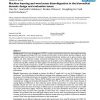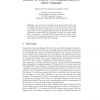140 search results - page 13 / 28 » Language Learning With Some Negative Information |
118
click to vote
AIRS
2010
Springer
14 years 12 months ago
2010
Springer
Many tasks of information extraction or natural language processing have a property that the data naturally consist of several views--disjoint subsets of features. Specifically, a ...
143
click to vote
BMCBI
2006
15 years 1 months ago
2006
Background: Word sense disambiguation (WSD) is critical in the biomedical domain for improving the precision of natural language processing (NLP), text mining, and information ret...
104
click to vote
CIKM
2005
Springer
15 years 7 months ago
2005
Springer
Little work to date in sentiment analysis (classifying texts by ‘positive’ or ‘negative’ orientation) has attempted to use fine-grained semantic distinctions in features ...
139
click to vote
ER
2006
Springer
15 years 5 months ago
2006
Springer
One of the main drawbacks of the Semantic Web is the lack of semantically rich data, since most of the information is still stored in relational databases. In this paper, we presen...
111
click to vote
ECML
2001
Springer
15 years 6 months ago
2001
Springer
Abstract. This paper presents a simple unsupervised learning algorithm for recognizing synonyms, based on statistical data acquired by querying a Web search engine. The algorithm, ...


